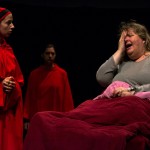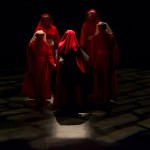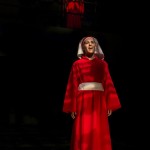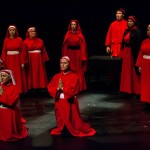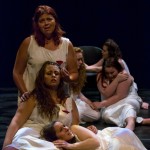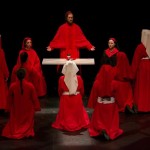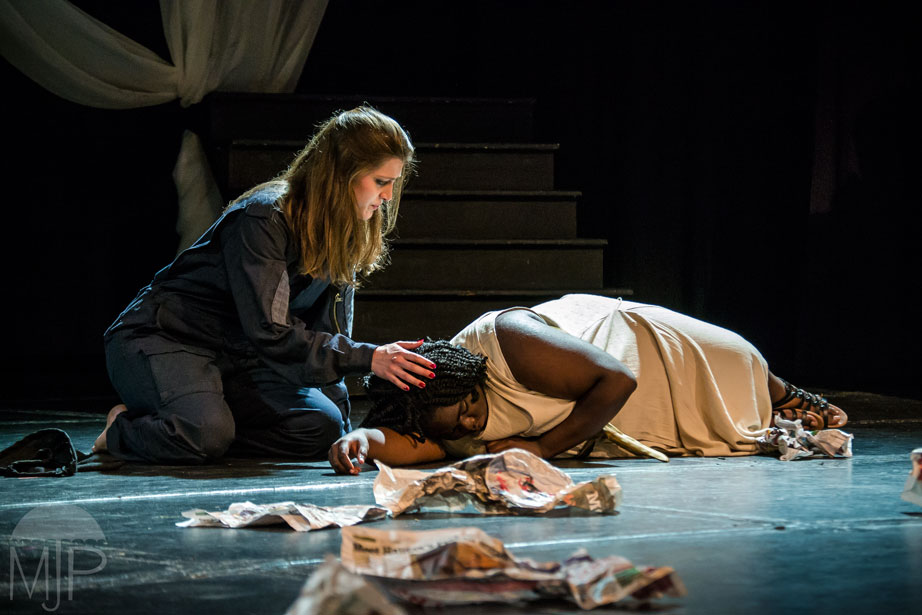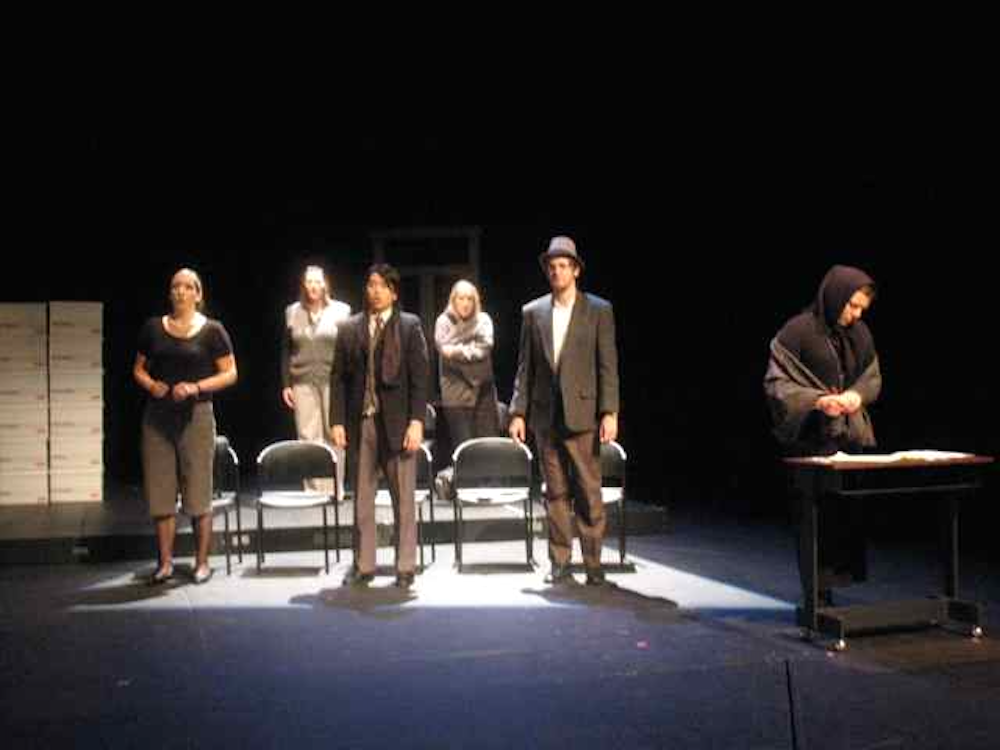All photos credited to Emily Jewer of MJ Photographics in Halifax
One of the most beautiful operas of the 20th century, Poulenc’s masterpiece combines a gripping story of a community of nuns in a time of revolution with a lush and almost romantic score, reminiscent of Puccini, at times. This is a stunning work.
music director: Tara Scott
stage director: Edward Franko
vocal coach: Lenard Whiting
stage manager: JoAnna Black
lighting design: Colin Richardson
costume designer: Kali Carys
specific casts will be announced by Friday July 26, 2013
Carmelites Performances – Neptune Studio Theatre 
Les dialogues des carmélites by Poulenc August 9
August 14August 11
August 17
Marquis de la Force Ryan Downey Giovanni Spanu
Chevalier de la Force Zachary Rondinelli Willis Beauté
Blanche de la Force Elizabeth Humphries Ashley Buckhout
Madame de Croissy, Prioress Nina Scott-Stoddart Jennifer Routhier
Madame Lidoine, the new Prioress Jillian Bonner Kristina Agur
Mother Marie Heather Wilkie Heather Wilkie
Sister Constance Kate Applin Sharon Tikyrian
Mother Jeanne Hannah Stewart Hannah Stewart
Sister Mathilde Rachel Wood Rachel Wood
L'Aumônier, the chaplain Christopher Wattam Michael Hart
M. Javelinot/Jailer/Second officer Lawrence Shirkie Andre Gaudet
Carmelites Adrienne Lusk
Shannon Halliwell
Jesseca Patrylo
Lise Renault
Kim Allred
Christine Browne-MunzAdrienne Lusk
Shannon Halliwell
Jesseca Patrylo
Lise Renault
Kim Allred
Christine Browne-Munz
Thierry Giovanni Spanu Ryan Downey
First Officer Willis Bote Zachary Rondinelli
La Foule Jennifer Routhier
Ashley Buckhout
Jillian Bonner
Sharon Tikiryan
Mike Hart
Andre GaudetElizabeth Humphries
Kristina Agur
Kate Applin
Christopher Wattam
Lawrence Shirkie
Full Synopsis
ACT I. The first rumblings of a revolution are starting to shake the Old Regime. In his library, the Marquis de la Force talks worriedly with his son, the Chevalier, about Blanche, his nervous, impressionable daughter, who is unable to overcome her fear of life. Blanche suddenly appears, frightened by rioting peasants who surrounded her carriage on the way home. Soon after retiring, Blanche returns, terrified by a shadow when a footman lit candles in her room. She blurts out to her father that she wishes to become a nun.
Several weeks later, in the receiving room of the Carmelite convent, Blanche speaks with Mme. de Croissy, the mother superior, who warns her against illusions about the heroism of a religious life. Blanche, accepted by the order, discusses death with another young nun, Sister Constance, as they sort groceries. Blanche scolds Constance for her seemingly immature cheerfulness. Constance says she has always felt she would die young, adding she is sure she and Blanche will die together.
On her deathbed, Mme. de Croissy charges Mother Marie with Blanche’s spiritual development. The young novice is present when, in her final delirium, the mother superior confesses great confusion and fear in her hour of death.
ACT II. In the convent chapel that night, the mother superior lies in state, with Blanche and Constance standing watch. As Constance goes to fetch their replacements, Blanche is overcome by fear. She starts to leave as Mother Marie arrives. Seeing that the girl is genuinely afraid, Mother Marie tries to reassure her.
Constance explains to Blanche that the mother superior’s hard death did not suit her and must have been meant for someone else, who one day will find death surprisingly simple.
In the chapter room, the nuns are gathered for the ceremony of obedience to the new prioress, Mme. Lidoine.
The Chevalier visits Blanche before escaping, urging her to leave the convent: their father is afraid for her. Blanche refuses, explaining that her highest duty is to the convent that has changed her life.
In the sacristy, the Chaplain, forbidden to perform his clerical duties, celebrates his last Mass. As he goes out, the sisters discuss the epidemic of fear that has left France unable to defend its priests. This gives Mother Marie the idea of the Carmelites’ offering their lives to the cause, but Mme. Lidoine reminds her one cannot choose to be a martyr. The Chaplain returns, saying his departure was blocked; he escapes by another route as the mob knocks at the main entrance. Seeing Blanche desolate, Mother Jeanne hands her a figurine of the Christ Child as a keepsake, but in her nervousness Blanche drops and breaks it.
ACT III. As the nuns prepare to leave their devastated convent, Mother Marie addresses them in the absence of Mme. Lidoine. She proposes they all take the vow of martyrdom, which must be unanimous. A secret vote reveals one dissenter. Constance claims it was hers, asking permission to change it. She kneels with Blanche to take the vow.
Back in the library of the Marquis de la Force, Blanche is working as a servant for revolutionaries who have taken over the mansion. She is found by Mother Marie, who says it is time to rejoin the other sisters. Blanche confesses she is still dogged by fear: her father was guillotined the week before. Mother Marie gives her an address, telling her to report there within twenty-four hours.
In a street in the city, Blanche learns from an old woman that the nuns have been arrested.
In a cell in the prison, Mme. Lidoine tells the Carmelites she will join in their vow of martyrdom – made during her absence. Constance says she has dreamt of Blanche’s return. A jailer reads the death sentence pronounced earlier by the Revolutionary Tribunal.
The Chaplain meets with Mother Marie and tells her the nuns have been condemned. Though she desperately wants to join them, the Chaplain reminds her she cannot make a martyr of herself: that is for God to choose. The Carmelites march to the guillotine, chanting the Salve Regina. Beginning with the mother superior, each is led up to death, as their numbers and their voices are cut off one at a time. Finally, only Constance remains. On her way to the scaffold, she sees Blanche step from the crowd, take up the chant and follow her.

